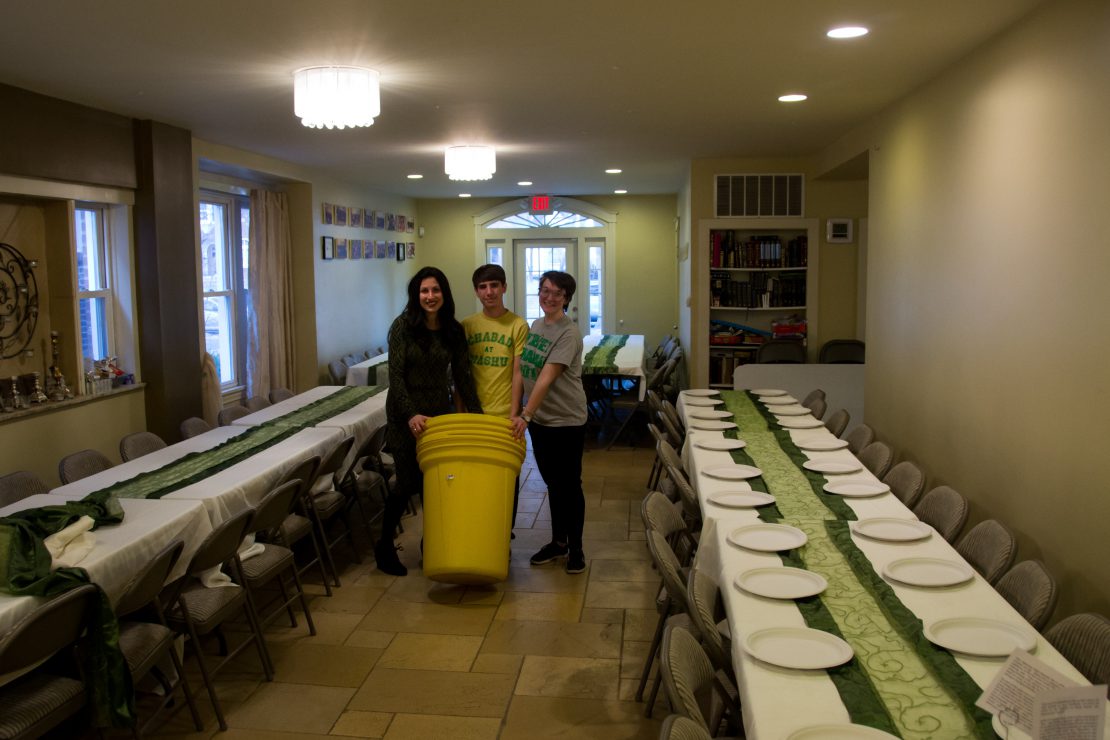This Chabad is going green.
Chabad at Washington University in St. Louis, Missouri, held their first landfill-free Friday night dinner this past January, where everything not eaten was either composted, reused, or recycled.
Chana Novack, who leads Chabad at Washington U with her husband Rabbi Hershey, says it was the students who originally came up with the idea; the university’s Green Events Commission (GEC), which promotes sustainability in event planning, reached out to Chabad last year with a suggestion to go landfill-free, and provided them with funding for eco-friendly materials.
“The students have been part of the process all along,” Novack says. Some of Chabad’s kitchen staff is part of the composting commission, and throughout the dinner, students helped ensure that the different materials were properly sorted.
Barak Davidi, a Washington University freshman, is Chabad’s Green Coordinator and liaison to the GEC. He worked behind-the-scenes to get the dinner up and running. “I reached out to a representative from [the GEC] who helped us acquire compost bags and suggested other points of improvement,” he says. “We then invited other sustainability groups from campus and notified everyone at the dinner that we were aiming for a landfill-free event.”
The biggest challenge, says Novack, is in the sheer numbers—as many as 150 students participate at a typical Shabbat dinner. “When you have that many people in such a short period of time, convenience often overtakes what might be the most eco-friendly option,” Novack explains.
The solution? Find a green alternative to the usual disposables. With donations from parents and alumni, Chabad was able to purchase cutlery and serving utensils that have a greater initial cost but are reusable. A grant from the student government allowed Chabad to obtain compostable items such as plates and bowls. “We swapped out a lot of things that we normally use to ensure that everything was recyclable,” says Novack.
“The students attending played a role in sorting and composting their plates, in hopes of making the event more educational,” adds Davidi.
Chabad plans to make their landfill-free Shabbat dinners a weekly occurrence. While compostable plates and bowls are more expensive than regular ones, Chabad raised funds to purchase enough for this semester, and the student government sponsors compost services provided by a local company.
Other Chabad events are eco-friendly where possible; this past Rosh Hashanah, after a dinner for 500, Chabad diverted two full bins from landfill to compost. “We want students to be more aware of what the impact of our actions are,” Novack says, explaining that caring about the environment is a Jewish value.
Sophomore Hammy Sorkin, who is studying for a degree in Environmental Earth Science, says she loves the idea of a landfill-free dinner, especially for such a large, weekly event. “I’ve noticed that the students who attend will collect the plates at the end of the night to compost them, which wasn’t done when they had to be thrown away. We usually have so much extra food, and what we can’t save (the dressed salad, for example) gets to be turned into soil!”
The Novacks, who moved to St. Louis in 2002 to serve Washington University’s nearly 2,000 Jewish undergrads, welcome the opportunity to help students pursue their interests. “When students and young people are passionate about something that will help the world, we, as Jewish community leaders, embrace that passion and do what we can to connect that to Jewish identity and experience,” says Chana.
To learn more about Chabad at Washington University, visit their website at www.ChabadWashU.org.

Be the first to write a comment.